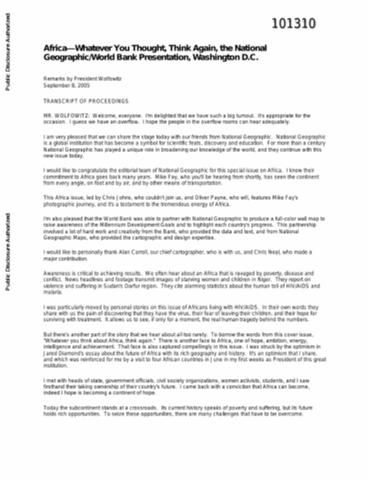Resource information
Paul Wolfowitz, President of the World Bank, congratulated the editorial team of National Geographic for the special issue on Africa. National Geographic has played a unique role in broadening the knowledge of the world. The World Bank partnered with National Geographic to produce a full-color wall map to raise awareness of the millennium development goals (MDGs) and to highlight each country's progress. We often hear about an Africa that is ravaged by poverty, disease and conflict. There is another face to Africa, one of hope, ambition, energy, intelligence and achievement. That face is also captured compellingly in this issue. Africa’s future holds rich opportunities. To seize these opportunities, there are many challenges to overcome. Given the enormous scale of this challenge, we need to come to terms with what we can and cannot achieve with the MDGs. The World Bank is working with countries that request help to strengthen legislation and institutions so they can take charge of combating corruption. Africa's transformation will depend on the commitment of the international community and the resolve of Africa's people and leaders. Michael Fay, National Geographic Explorer in Residence, spoke of his travels in Africa and said that there is a very direct relationship in particular in the African continent, but indeed everywhere on earth, between the management of the natural resource base and poverty alleviation, the wellbeing of humanity. Frannie Leautier, of the World Bank Institute, said countries working together can reach solutions that are much better than when they work individually. She noted the need to balance between human life and other life forms, with the forests, animals and so on. Paulo Gomes, of the World Bank Board of Directors, said the issue was very rich in presenting the ecological dimension of the diversity of Africa. The Bank needs to do something in preparing a comprehensive strategy to rebrand Africa in a more positive light. Africa has a formidable reservoir of variety in fauna and flora that can be used for science and the good of the continent. The panel fielded questions on urban ecology, indigenous knowledge, resource management, and governance amid ethnic diversity.


